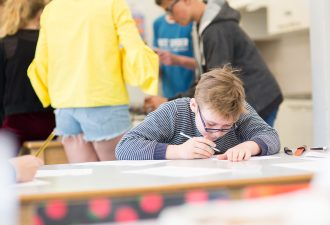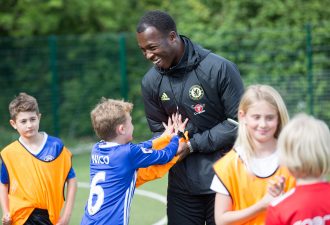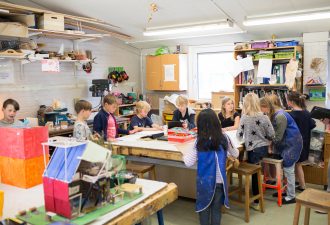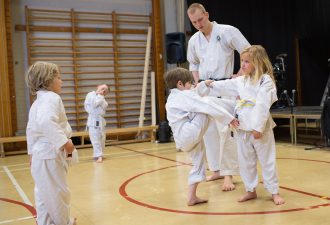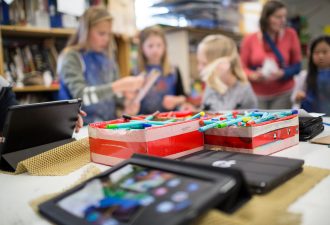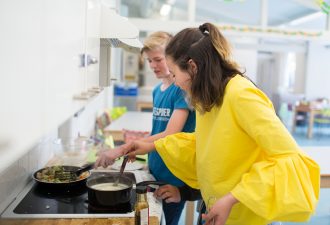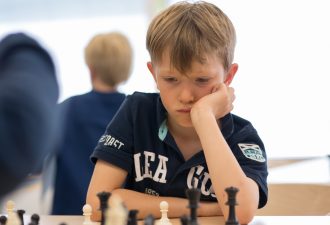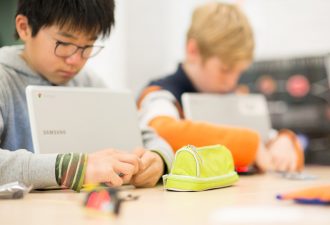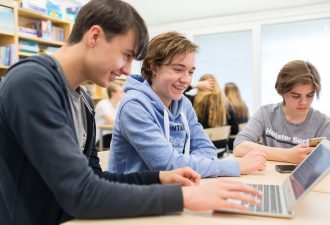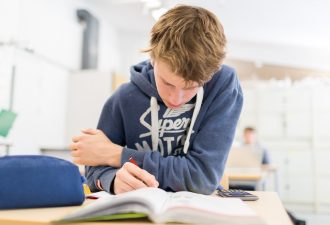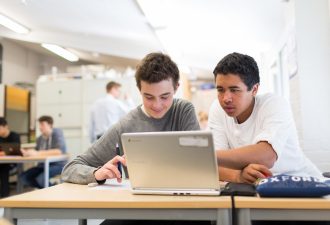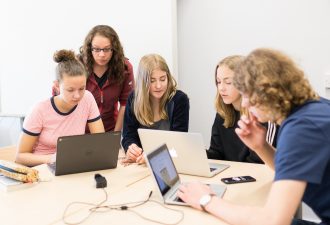Primary and Secondary education
At the Swedish School our aim is to create a learning environment that is inspiring and supportive, where pupils take a leading role in their own education. We strive for our Primary and Secondary pupils to become responsible, social, inquisitive citizens of the world, equipped with the tools to make informed choices.
Our teaching follows the Swedish national curriculum, which we expand upon with an emphasis on the English language and field trips both within and beyond London.

Our learning environment
With an average of 14 pupils per teacher, our small Primary and Secondary classes enable highly personalised teaching and dynamic, flexible lessons. This makes it possible for pupils and their teachers to set and achieve ambitious academic goals throughout the year.
The small size of our school – and our close connection to Sweden – also lends itself to a strong community feeling. Across all education levels, we cultivate a friendly and caring atmosphere, where each pupil is recognised and valued as an important member of our community.

"It is like a family, everyone knows each other and it is easy to become a part of the class as a new student. Everyone can be themselves and keep their own identity, which is good!"

Teaching methodology
At the forefront of our teaching methodology is the desire to instil curiosity and a love of learning. We value good relationships between teachers and pupils and work purposefully to maintain a positive ethos and spirit at school. Our classes mix pupil-led and teacher-led activities to promote successful learning.
When it comes to pupil performance evaluations, we use a formative feedback approach. Throughout the course of a project, teachers will have individual discussions with pupils about what they are doing well and which areas need more work. This way pupils are empowered and know what they need to do to achieve a better result.
Classes F-3
In years Förskoleklass to year 3, classes have a form teacher who provides instruction in all academic subjects and is responsible for contact with parents. Teaching groups comprise 12-16 pupils. For pupils in years 1-3, we offer English lessons according to ability, with four different teachers providing tailored instruction. Subjects such as art and music are taught by specialist teachers.
Classes 4-6
From year 4 onwards, pupils attend classes for individual subjects, led by teachers who are experts in their field. Pupils are assigned a mentor who looks after their development and well-being and serves as the first point of contact for parents.
Classes 7-9
In years 7 -9, pupils continue their individual subject learning with specialist teachers, and have a mentor who provides guidance and keeps in contact with their parents.
Language learning at SSL
At the Swedish School in London, we prioritise working towards fluency in Swedish and English simultaneously.
A significant amount of time within Swedish lessons is allocated to reading, writing and grammar which as well as being essential also benefits the children of expats who may not have lived in Sweden, allowing them to understand their own culture. We also see it as important to adapt to our surroundings and thus place more emphasis on English than most Swedish schools. Our pupils can also study a third language, as is the norm in Swedish schools.
Written statement of relationships and sex education
As a school, we have a longstanding commitment to delivering an excellent RSE programme; a curriculum which is under continuous review and development in order to be at the forefront of this area. We strive to ensure that up-to-date, relevant, accurate and age-appropriate Relationship Education (Primary) and Sex and Relationships Education (Secondary) is taught to pupils with utmost sensitivity and inclusivity.
We have thoroughly reviewed the School’s current RSE provision against the Department for Education’s (DfE) draft guidance, which was published in February 2019 (Relationships Education, Relationships and Sex Education and Health Education (England) Regulations 2019 – made under section 34 of the Children and Social Work Act 2017). We are satisfied that the curriculum we have in place more than fulfils the DfE’s guidance as well as that of Swedish requirements.
To be effective for all, it is important that the school works collaboratively with parents, with the clear recognition that parents/carers are the “first teachers of…children” (DfE, 2019) in this regard. Any concerns about the School’s RSE programme, including a request for a child to be withdrawn from RSE lessons, should be discussed with the Head (Primary/Secondary school) or the Deputy Head (6th form), making it clear which specific aspects they wish their child to be withdrawn from.

